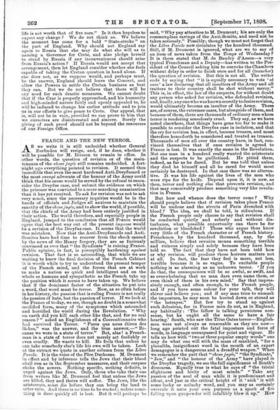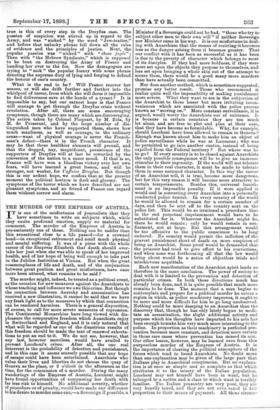FRANCE AND THE NEW TERROR.
AS we write it is still undecided whether General Zurlinden will resign, and, if he does, whether it will be possible for M. Brisson to remain in office. In -other words, the question of revision or of the main- tenance of the chose jugle still remains undecided. A fort- night ago everything pointed to revision. It seemed then incredible that even the most hardened Anti-Dreyfusard or the most enrage advocate of the honour of the Army could think that his cause would be served by the refusal to recon- sider the Dreyfus case, and submit the evidence on which the prisoner was convicted to a more searching examination than it has yet received. To ask for revision was not to ask very much, since the necessary inquiries would be in the hands of officials and Judges all anxious to maintain the sanctity of the chose jugee, and to show the world, if possible, that the chiefs of the Army had been entirely justified in -their action. The world therefore, and especially people in England, jumped to the conclusion that all France would itgree that the best way out of the present impasse would be a revision of the Dreyfus case. It seems that the world was mistaken. Now that the Anti-Dreyfusards and Anti- Seinites have had time to recover from the shock caused by the news of the Henry forgery, they are as furiously convinced as ever that "the Syndicate" is ruining France. Public opinion, in fact, is perceptibly hardening against revision. That fact is so astounding, that while we are waiting to know the final decision of the French Cabinet it is worth while to try to understand the present temper of the French mind, and the forces that are at work to make a nation so quick and intelligent and on the whole so humane and sympathetic as the French take up the position which it seems to have taken up. We believe that if the dominant factor of the situation be put into • a word, that word must be terror. Now, as so often before in her history, the passion that is ruling France is not really the passion of hate, but the passion of terror. If we look at the France of to-day, we see, though no doubt in a somewhat modified form, many of the symptoms which astounded and horrified the world during the Revolution. "Why on earth did you kill each other like that, and for no real reason ? " asked an Englishman of a Conventionnaire who bad survived the Terror. " Parce que nous tions des laches," was the answer, and the true answer,—" Be- cause we were in a state of terror." But, alas ! a French- man in a state of terror does not merely act foolishly or even cruelly. He wants to kill. He feels that unless he -can take somebody else's life his own will be taken. Look at the extract we quote in another column from the Libre Parole. It is the voice of the Pere Duchesne. M. Drumont in effect and by inference tells the Jews that their blood shall run as in the September massacres, and their corpses choke the sewers. Nothing specific, nothing definite, is urged against the Jews. Only, those who take their cue from writers like M. Drumont feel that unless the Jews are killed, they and theirs will suffer. The Jews, like the anstocrats, must die before they can bring the land to utter ruin. And there is no time to be wasted ; unless some- thing is done quickly all is lost. But it will perhaps be said, "Why pay attention to M. Drumont; his are only the commonplace ravings of the Anti-Semite, and need not be taken seriously." Possibly; though we must not forget that the Libre Parole now circulates by the hundred thousand. Still, if M. Drumont is ignored, what are we to say of an item of news taken from the Temps of Wednesday ? It is there stated that M. de Baudry d'Asson—a very typical Frenchman and a Deputy—has written to the Pre- sident of the Council asking him to convoke the Chambers without delay in order to finish once and for all (trancher) the question of revision. But this is not all. The writer ends by saying that "it is equally necessary to vote 'at once' a law declaring that all insulters of the Army and all traitors to their country shall be shot without mercy." This is, in effect, the law of the suspects, for without doubt any person who asked for revision, who defended revision, and, finally, any one who was known secretly to desire revision, would ultimately become an insulter of the Army. These are, of course, the extremer cases, but alongside of them, and because of them, there are thousands of ordinary men whom terror is rendering senselessly cruel. They say, as we have noted elsewhere, that things have gone too far to make it possible to consider the Dreyfus case in isolation, and that the cry for revision has, in effect, become treason, and must therefore henceforth be considered and treated as treason. Thousands of men all over the country have, in fact, con- vinced themselves that if once revision is agreed to France is lost. It was exactly the same in the Revolution. Not one man in a hundred really wanted the aristocrats and the suspects to be guillotined. He pitied them, indeed, as far as he dared. But he was told that unless they died he himself and all he cared for would most certainly be destroyed. In that case there was no alterna- tive. It was his life against the lives of the men who were ripe for the knife. 'Depend upon it, it is now, as then, terror and nothing else that prevents revision, and that may conceivably produce something very like revolu- tion in France.
But how and whence does the terror come ? Why should people believe that if revision takes place France will be undone and the streets of Paris drenched with blood ? The idea, we shall be told, is ridiculous. If the French people only choose to say that revision shall be conducted quietly and soberly and without dis- turbance, what possible opportunity can there be for revolution or bloodshed ? Those who argue thus know very little of the French character or of French history. Frenchmen by the hundred thousand, nay, by the million, believe that revision means something terrible and ruinous simply and solely because they have been told so. The fact that they have not been told how or why revision will produce these horrors matters not at all. In fact, the fear they feel is more, not less, terrible because it is so vague. To excitable people nothing is so alarming as an unknown terror. If you do that, the consequences will be so awful, so swift, and so overwhelming that no man dare even name them, or even think of them in his own mind.' Say that impres- sively enough, and often enough, to the French people, and if you have some colour for your talk, they will shiver and believe you ; and if any man tries to unmask the imposture, he may soon be hooted down or stoned as "the betrayer." But few try to stand up against such delusions, for in France men do not, as in England, say habitually : 'The fellow is talking pernicious non- sense, but he ought all the same to have a. fair hearing.' South, who saw the Titus Oates terror—English- men were not always as reasonable as they are now— long ago pointed out the fatal imposture and force of words, in language unsurpassed for point and vigour. He tells us how with "two or three popular empty words" one may do what one will with the mass of mankind, "for a plausible, insignificant word in the mouth of an expert demagogue is a dangerous and a dreadful weapon." When we remember the part that "chose jugie," "the Syndicate," "Jew," and "the honour of the Army" have played in the Dreyfus tragedy, we see the full significance of South's discourse. Equally true is what he says of "the trivial slightness and levity of most minds." " Take any passion of the soul of man while it is predominant and afloat, and just in the critical height of it ' nick ' it with some lucky or unlucky word, and you may as certainly overrule it unto your own purpose as a spark of fire falling upon gunpowder will infallibly blow it up." How true is this of every step in the Dreyfus case. The passion of suspicion was stirred up in regard to the Army, and was " nicked " by the word "Jew-traitor," and before that unlucky phrase fell down all the rules of evidence and the principles of justice. Next, the popular passion was " nicked " with "chose juges" ; Then with "the Hebrew Syndicate," which is supposed to be bent on destroying the Army of France and handing her over to the foe. Now the demagogues are trying to " nick " the popular frenzy with some phrase denoting the supreme duty of lying and forging to defend the honour of one's country.
What is the end to be ? Will France recover her senses, or -will she drift further and further into the whirlpool of terror, from which she will deem it impossible to find deliverance save at the hands of a tyrant ? It is impossible to say, but our earnest hope is that France will manage to get through the Dreyfus crisis without revolution. After all, there are some encouraging symptoms, though there are many which are discouraging. The action taken by Colonel Picquart, by M. Zola, by M. de Pressensd, and by the large number of dis- tinguished men who have supported them, shows how much manliness, as well as courage, in the ordinary sense—want of physical courage is never the French- man's defect—there is in the French character. It may be that these healthier elements will prevail, and that the dogged, nay, magnificent, persistence of the supporters of Dreyfus will at last be rewarded by the conversion of the nation to a saner mood. If that is so, France will have won a bloodless victory over her own fears, will have learned a great lesson, and will be stronger, not weaker, for l'affaire Dreyfus. But though this is our ardent hope, we confess that at the present moment the political horizon is dark and gloomy. The symptoms of the terror which we have described are not pleasant symptoms, and no friend of France can regard them without sorrow and alarm.



































 Previous page
Previous page